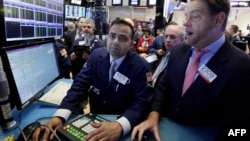Global stock markets rose Thursday, a day after major U.S. indexes, the Dow Jones Industrial Average and the S&P 500, reached record highs.
In Japan, the Nikkei finished up 1.8 percent in Thursday’s trading, while Hong Kong’s Hang Seng closed up 1.4 percent.
Markets in London and Frankfurt were also up Thursday.
New milestone
The Dow, the most well-known U.S. stock index, closed above 20,000 for the first time Wednesday (20,068.51), and is up 9.5 percent since Donald Trump won the country’s presidential election in early November.
Investors have apparently been encouraged by Trump’s promise to cut regulation and reduce taxes. Businesses often complain that taxes and rules make it more difficult to make profits.
“I think it was the first two days of President Trump issuing a lot of executive orders, and that pretty much told Wall Street that he really is going to attempt to fulfill the promises that he made during the campaign,” said Sam Stovall, chief investment strategist at CFRA Research.
While the 20,000 milestone is largely symbolic, PNC Bank economist Gus Faucher says it still indicates improved outlook for corporate profits. Stock market gains can boost the consumer spending that drives most U.S. economic activity because it boosts wealth for households that own stock.
Some analysts say Trump’s policies could also push up inflation and interest rates, which could help banks become more profitable. That may be why major financial firms like Goldman Sachs and JPMorgan have made major gains recently.
“I think that we’re seeing a bit more inflation. We were getting that without Mr. Trump, we’ll get a little more,” said Peter Morici, an economist and international business professor at the University of Maryland. “I think we’ll be above 2 percent for a while, and I think the Fed will be gradually raising interest rates, half a percentage point, three-quarters of a percentage point a year.”
Bankruptcies down
A separate report showed that bankruptcy filings had fallen back to the levels seen before the financial crisis. U.S. federal courts said fewer than 800,000 cases were filed in 2016, a nearly 6 percent drop from the prior year and the lowest level since 2006.
The Federal Housing Finance Agency said home prices rose 0.5 percent in November, a bit faster than in the prior month. Home prices advanced 6.1 percent for the 12 months ending in November.
Among other reports this week, surveys of economists predicted unemployment claims would stay at a low level consistent with a healthy job market, and that the U.S. trade deficit would narrow.
Experts also predicted that Friday's report on the U.S. gross domestic product would show the world's largest economy expanded at a 2.2 percent annual pace in the last three months of 2016. That would be slower than the rate in the previous quarter.




